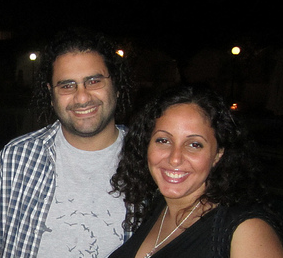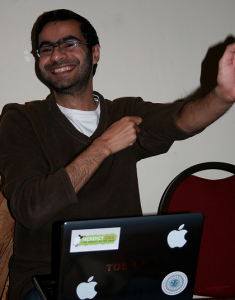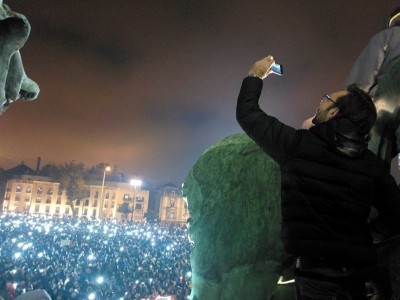This article is was originally posted on Global Voices Online
With all of the social media successes throughout the Middle East and North Africa in 2011, it would be all too easy to overlook the struggles faced by bloggers and netizens throughout the region. And yet, 2011 was an extraordinary difficult year for free expression, from Egypt's shutdown of the Internet to the numerous harassed, arrested, and detained bloggers from the Maghreb to the Gulf.
Iran: No room for free expression
Less than a week into 2012, Reporters Without Borders puts the number of jailed netizens globally at 126. Within the list, Iran stands out, as my colleague Fred Petrossian writes:
In 2011, the Iranian regime was faithful to its reputation as an enemy of internet as it continued to repress bloggers and even threaten their lives. Blogger Sakhi Rigi got a record breaking 20-year jail sentence. Hossein Ronaghi Maleki, who is serving 15 years in prison, struggled for his health and for a period was deprived of contact with his family and lawyer. RSF talked about the plight of seven netizens in Iran in July 2011. These cases are just the tip of the iceberg. While a few bloggers likeShiva Nazar Ahari andHossein Derakhshanwere released on bail, others like Mohammad Reza Pour Shajari may face charges of ‘Waging War Against God’ (moharebeh), for which a death sentence can be pronounced. As Omid Reza Mirsayafi‘s tragic death shows, the more a blogger is isolated and deprived of a network, the more he is in danger.
Egypt, Syria, Bahrain among the region's worst
But while Iran may rank worst in terms of the number of bloggers detained, life for bloggers in much of the rest of the region has been no picnic. In Syria, where the uprising that started last spring shows few signs of abating, several prominent bloggers were arrested in 2011, threatening countless more into silence. Razan Ghazzawi, a former Global Voices contributor, spent fifteen days in prison in December until being released on bail, but still faces trial for “weakening the national sentiment,” among other charges. Hussein Ghrer, released in early December, also faces trial. Meanwhile, Tal Al-Mallohi, the teenaged blogger imprisoned in 2009, is serving a five year sentence.

Egyptian blogger Alaa Abd El Fattah poses with his wife and fellow blogger Manal Hassan in Tunis just one month before his arrest
Egypt–where social media had arguably the largest impact in 2011–has also seen numerous bloggers struggle for their freedom. Blogger Maikel Nabil Sanad, who was arrested in March, was recently sentenced to two years in prison for criticizing the interim military regime on his blog. Sanad has spent much of his incarceration on hunger strike. Alaa Abd El Fattah, who was released on December 25 after nearly two months in prison, still faces trial on a number of trumped-up charges, a clear indication of his being a target for his outspokenness against the military. Another blogger, Ayman Youssef Mansour, was sentenced in October by a civilian court to three years in prison for insulting religion on his Facebook page. Several other netizens have faced military questioning for online postings. The Egyptian campaign to end military trials for civilians has been instrumental in highlighting such cases.
A third country in the region ranks among the worst in 2011, though one wouldn't know it from following mainstream media coverage. Bahrain, where a nascent uprising was all but quashed early in the year, levied harsh punishments on several bloggers in 2011, including Global Voices Advocacy contributor Ali Abdulemam, who was sentenced in absentia to fifteen years in prison and is currently in hiding.
Similarly, Abduljalil Al-Singace was given the same sentence. Earlier in the year, authorities briefly detained prominent bloggers Mahmood Al-Youif and Mohamed El-Maskati, while closer to the end of 2011, Zainab Al-Khawaja was briefly imprisoned, her brutal arrest caught on video. And most tragically, Zakariya Rashid Hassan Al-Ashiri became the second blogger ever to die in prison in March.Elsewhere in the region, the struggle continues
Though perhaps less systematically, other countries in the region targeted bloggers as well in 2011. Prior to the fall of Ben Ali, Tunisian bloggers Slim Amamou (a Global Voices Advocacy contributor) and Azyz Amami were briefly imprisoned. Amami was then arrested again and beaten by police in September. Though the arrest was not for his blogging but for a joke told near a police station, it demonstrated the tenuous state of free expression in the country.
In Morocco, a blogger and several activists were arrested in September, while Saudi Arabia went after video bloggers who had been documenting poverty in the oil-rich country. And in the UAE, a female blogger was summoned for interrogation over a tweet.
Fighting for a better 2012
Though this represents only a fraction of those intimidated, harassed, and imprisoned in 2011, it is illustrative of the continued struggle faced by bloggers, activists, and other netizens in the region. And as 2012 kicks off with such a large number of bloggers in prison, it is apparent that there is more work to be done to ensure that the right to free expression is guaranteed for everyone. And fortunately, a growing number of grassroots organizations in the region are taking up the fight for digital rights. But nevertheless, bloggers must be ever vigilant, and consider the risks they face as they take their activism online. Global Voices salutes these brave bloggers and will continue to make sure their voices are heard throughout the world.
Photo credits: Jillian C. York.




